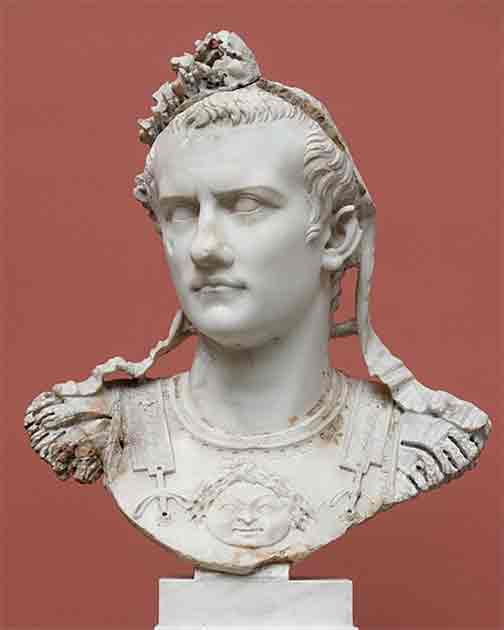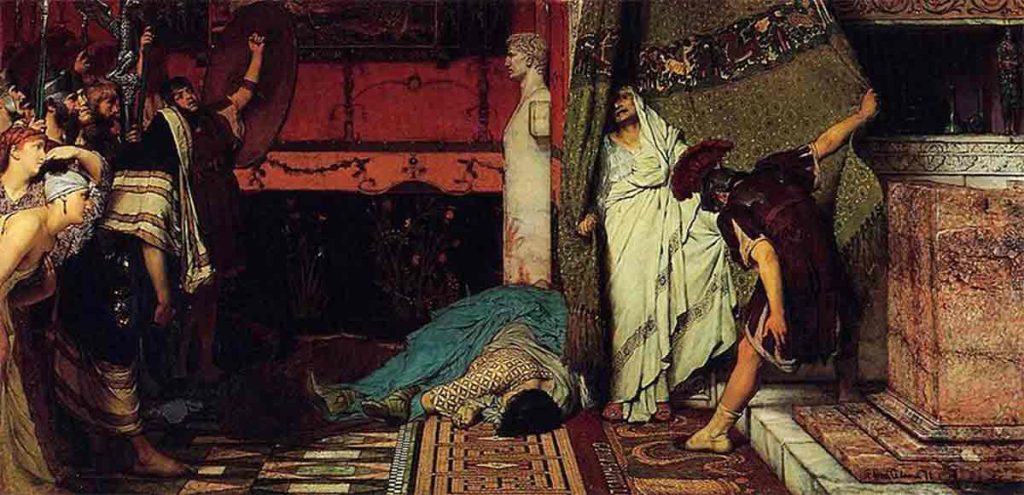A casual glance at Roman history seems to suggest it followed a straightforward path. The Roman Republic was superseded by the actions of Julius Caesar, and starting with his nephew and heir Augustus the line of “Caesars” ruled for centuries.
Rome started as a republic and became an empire, a straightforward transition, right? But a closer look shows that there were several moments when the transition was tested, and perhaps the most momentous came with the transition between the third and fourth emperors.
Gaius Caeser Augustus Germanicus was better known by his nickname Caligula. He was a Roman Emperor from AD37 until he was assassinated in AD41. His father was the well-respected Roman general Germanicus, the adopted son of Tiberius, and his mother was Agrippina the Elder, the granddaughter of the Roman Emperor Augustus.
Claudius (Tiberius Claudius Caesar Augustus Germanicus) on the other hand, followed Caligula as Emperor in AD41 and lasted until AD54. He was the first Roman emperor to be born outside of Italy.
He was born in Lugdunum (modern-day Lyon) to Antonia Minor and Nero Claudius Drusus, another famous Roman General. He was the brother of Germanicus, and thus Caligula’s uncle.

Claudius was not favored to be Emperor and yet his accession as the last available relative of Julius Caesar stopped the Republic from being restored. How did this happen?
Caligula and his Demise
Caligula was born in Antium in AD12 on 31st August. He was the 3rd of 6 children. Agrippina the Elder was the granddaughter of Augustus giving Caligula a strong claim to follow in his great-grandfather’s footsteps.
Germanicus was the grandson of Mark Antony who appeased other factions within Rome. During his younger years, Caligula accompanied his father in Germania on the campaigns.
The soldiers became so attached to Caligula and the miniature soldier’s outfit that he wore, that they named him Caligula. This is loosely translated to “little boots”. It has been presumed that the soldiers treated Caligula like a mascot.
Unfortunately, his father died in AD19, and Caligula lived with Agrippina. Many believed at the time that Germanicus had been poisoned by Emperor Tiberius because he had been a potential rival.
It has been well recorded that Agrippina had her own imperial ambitions and hoped that her sons would be able to fulfill their father’s potential. Her relationship with Emperor Tiberius rapidly deteriorated as he felt that he was under constant threat not just from Agrippina and her family but from all factions in the Roman Empire.
Agrippina was never allowed to remarry in case it would reinspire her political ambitions. Caligula was taken under close supervision by Tiberius’s mother, Livia until she died and his grandmother Antonia Minor, took over his care. In 30 AD to ensure that there was no rival from Caligula’s family, Tiberius declared his brothers enemies of the state and imprisoned Caligula.
He remained under the close supervision of Tiberius for many years and was under direct supervision from Tiberius himself. Chroniclers record Caligula as well-informed, cultured, and a natural actor. Tiberius seems to have been fond of Caligula and gave him limited political power. Upon Tiberius’ death, Caligula, who had befriended the praetorian guard captain, became emperor.
Upon the announcement of Tiberius’ death, the praetorian guard declared Caligula as emperor and the senate ratified his ascension in Rome. Caligula entered Rome on 28th March, 12 days after Tiberius died, and it was confirmed that he was to take office.
In the early years, it was suggested that Caligula was well advised by his mentor Macro and that he performed well in the opening months. He was courteous, affable, and fair in law. He took his first consulship a few months after becoming emperor but refused the title of Pater Patriae because he deemed himself too young. Philo described Caligula as the first Roman Emperor to be admired by all the world. However, it would not last.
Caligula is said to have suffered severe headaches that led him to find distractions in other activities. After a severe illness, it seems Caligula began to enjoy more sexual proclivities than before and even engaged in incestuous relationships with his sisters and began sleeping with other wives and bragging about it.
Caligula began to kill for amusement. One story claim that Caligula ordered an entire section of the audience to be eaten by lions. Additionally, he attempted to build a bridge between his palace and a temple whilst declaring himself a god. One of the final insults he made was to make his horse a consul and a priest. After 4 years, Rome had had enough.

The Senate and the praetorian guard conspired to murder Caligula. Some wanted to restore the Republic with his death, his erratic reign serving as a stark warning about the risks and dangers of a hereditary ruler. The Republic was still just about within living memory at this time.
Claudius and the Republic
Claudius was well-known in the empire, but it was for his limp and deafness. He was excluded from public office until Caligula promoted him in AD37 as a joke.
- The Death of Romulus: What Happened to the Founder of Rome?
- Mausoleum of Augustus: Why Are There No Tombs of Early Roman Emperors?
It is likely that because Claudius was seen as a joke and not a threat, he survived the harsh culling of the family by Tiberius. Instead of pursuing public life, Claudius had become a historian and surprised many by his written word and oratory.
When Caligula was assassinated in 41 AD, there was no evidence to suggest that Claudius had anything to do with it. The only evidence is that he left the scene of the crime quickly but the tension in the palace at that time likely suggested to Claudius that it would not be good to be caught by either the senate or the Praetorian Guard.
With a power vacuum at the head of the Empire, the conspirators descended into infighting and disagreements as to how to proceed in the restoration of the Republic, if indeed that was the right course of action. Some pushed for the assassinations to extend to the entire Imperial family, wiping out the line of Julius Caesar and settling the debate.
This proved to be a suggestion too far, and the temerity of Claudius helped with his survival when faced with such brutality. Claudius was said to have hidden behind a curtain quaking. It was not until a member of the praetorian guard found him and declared Claudius Emperor that he came out from the curtain.

The Senate did not agree and demanded a meeting: many still did not want another emperor. Claudius alongside the praetorian guards refused to meet.
Whilst it is under some debate whether Claudius was a more active participant in his becoming emperor or whether the praetorian guard hoped to put him in charge so that they could manipulate him. Claudius proved himself to be an adequate ruler, and his balanced and equable rule after the excesses of Caligula put the possibility of a return to the Republic further and further away.
Despite his disabilities, Claudius was able to follow an extensive building program, he was an able administrator, and was able to restore many of the finances of the Empire after Caligula’s excessive spending. The Empire flourished under him in a way it never done before.
What stopped the Roman Republic from being restored? A power-hungry military group, an overly bloodthirsty suggestion from the Senate, and an emperor-in-waiting hiding behind a curtain.
Top Image: After the assassination of Caligula, Claudius was found cowering behind a curtain and proclaimed Emperor. His rule helped end calls for a restoration of the Roman Republic. Source: Lawrence Alma-Tadema / Public Domain.
By Kurt Readman